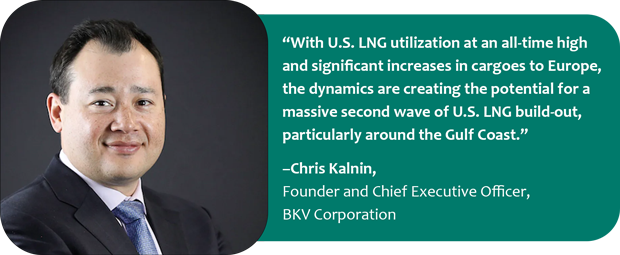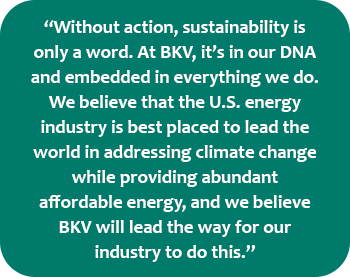
Sustainable Paths Entail Vision, Focus
By Chris Kalnin
Corporate sustainability has become a vague phrase that evokes skeptical questions about its real meaning and how it actually can be measured, specifically across the energy industry. Right or wrong, energy companies have developed a reputation for making bold claims about their sustainability.
Yes, BKV Corporation is an energy company–one with bold plans and big goals–yet, we acknowledge that it is one thing to communicate something, and another to actually do it. What makes BKV different?
Well, for one, we believe climate change is real, and we believe it is time for energy companies to drive climate change solutions. Going one step further, BKV’s climate change efforts run parallel with our sustainability mission to diversify and support energy transition to reduce our country’s dependence on foreign energy. We want to prove that producing low-impact, sustainable energy isn’t merely a good idea. It’s good business.
In 2015, we had the simple idea that the world’s unquenchable demand for energy and the need to take care of the planet required a different kind of energy company. BKV was created, and since then, we have enlisted the smartest talent, set aggressive operational targets and defined a clear strategic path to lead the industry toward the safe and profitable production of net-zero natural gas.
In seven years, BKV has become one of the top 20 gas-weighted natural gas producers in the United States and the largest natural gas producer in the Barnett Shale. Now with approximately 400 employees, inclusive of our latest acquisition in the Barnett, we are continuing down the path for net-zero natural gas by deploying new and existing technology to drive efficiencies and modernize our operations.
Often we are asked how we are able to position BKV to quickly capitalize on opportunities and generate success in such a short time frame. The answer is that we focus on maintaining a clear strategy, being nimble and having strong values to guide our company. If something operationally or transactionally does not create value or align with BKV’s identity, we don’t do it. With a clear strategy in place, we can operate at the highest level of integrity to take smart risks, leverage growth through acquisition and build strategic partnerships.
LNG Growth
Prior to discussing how BKV is making good on its commitment to actionable change today, it is critical to address the current state of the global energy market. Russia’s war in Ukraine has dramatically impacted our beliefs about the future of energy. Before the conflict, Russia was considered a major supplier of both oil and gas (and commodities) both for today and the foreseeable future. We watched Russia and China link arms as trade between them grew quickly. At the same time, Europe’s physical and energy security seemed to have relaxed. Lastly, it seemed as if the post-pandemic global economic recovery was underway, albeit with concerns around inflation and distribution of the recovery.
However, many anticipate sanctions have the potential to constrain Russia’s ability to supply additional oil and gas. China has been cautious about its budding relationship with Russia amid intense global scrutiny. And with significant concerns around inflation and variability in the economic outlook, many feel less optimistic about global economic recovery.
According to the International Energy Agency, Russia supplied 40% of total European Union gas demand in 2021, which has led Europe to actively seek to diversify its natural gas supply toward liquefied natural gas alternatives. As a result, the United States is in a unique position to support and enable Europe’s transition toward diversification and energy transition.
With U.S. LNG utilization at an all-time high and significant increases in cargoes to Europe, the dynamics are creating the potential for a massive second wave of U.S. LNG build-out, particularly around the Gulf Coast. However, existing infrastructure constraints will present a challenge for delivering gas to the coast, positioning the basins below “the arc of pain” to benefit most from these demand tailwinds.
Strategically located below this arc, the Barnett’s existing infrastructure offers tremendous pipe capacity headroom to deliver gas to Gulf Coast markets. It also has shallow decline rates–in comparison with all other gas basins–that make it ideal as a low-capital-reinvestment, high-reliability gas supply. Low decline rates mean greater predictability, or less risk, for forecasting production delivery.
And yet, the question remains. How does this impact BKV’s path to net-zero natural gas? The short answer is: significantly.
Addressing Emissions
As a private energy company that focuses on acquiring and developing high-quality natural gas production, midstream and power assets, BKV has made several acquisitions during the past two years that have grown our operational footprint to stretch across Texas and throughout the northeastern Pennsylvania Marcellus. Now that we officially have closed on the acquisition of XTO Energy’s natural gas upstream and associated midstream infrastructure in the Barnett, our total production and total reserves are approximately 900 million cubic feet equivalent a day and 5.8 trillion cubic feet equivalent, respectively. We have roughly 7,348 producing wells across 487,000 net acres, and our natural-gas-fueled power plant in Temple, Tx., produces a heat rate of 7,000 Btu/kWh at a capacity of more than 750 MW.
With this operational footprint in place, BKV can take what we call a “closed-loop,” four-step approach to net-zero. The loop starts with our upstream assets, where we are diligently implementing a robust emissions reduction program that aims at achieving net-zero emissions across Scope 1 and Scope 2 by 2025.
That seems like a bold claim, but BKV can back it up.
We project more than 70% of our Scope 1 and Scope 2 emission reductions will be achieved through internal investments in technological innovations and operational optimization. We have invested about $12 million to prototype and deploy electrified components into the production process, convert pneumatic gas instruments, enhance measurement technology, remove redundant equipment, and develop and draw on renewable energy sources, among other operational improvements.
We anticipate our “Pad of the Future” program will be the primary contributor to the expected emissions reduction. This program will upgrade existing facilities with modern technologies and eliminate emissions through key elements including asset consolidation, pneumatic conversion, electrification, and liquid consolidation and vapor capture. “Project Air Jordan,” our effort to swap pneumatic natural gas devices with instrument air devices, is a great example that illustrates how we are upholding our commitment the BKV way: innovating and deploying solutions to reduce our own emissions versus buying carbon offsets alone.
BKV Technical Services Foreman Cason Jordan and his team were given the benevolent challenge of inventorying all the pneumatics and converting them to instrument air. The process was anything but simple. It required a total pad retrofit, including downsizing, removing equipment and replacing the natural gas pneumatics with instrument air, and that was only one element of Project Air Jordan.
From 2021 to mid-2022, we tested air compression on 844 pads, a total of 1,445 wells. We converted 5,686 pneumatic devices, eliminated 343,794 metric tons of carbon dioxide equivalent (mTCO2e) emissions and inventoried more than 16,000 devices. We anticipate eliminating Scope 1 emissions associated with pneumatic devices by 637,717 mTCO2e by year-end 2022. By 2023, we expect to eliminate Scope 1 emissions associated with pneumatic devices, pneumatic pumps and TEGs by 371,983 mTCO2e.
The second component of our closed-loop approach creates synergistic opportunities with our upstream assets by pursuing midstream and power assets. For example, our most recent Barnett acquisition presents extensive synergies by allowing us to partner with a credible third party to certify our responsibly sourced gas (RSG) at the wellhead and have additional access to premier Gulf Coast markets, building on what previously was established to drive value through our continued Barnett expansion. We also announced in March a collaboration with Project Canary to apply first-of-kind environmental assessments and monitoring programs for our operations with the goal of delivering RSG to our power plant in Temple.
Checking The Boxes
Another component of our net-zero approach entails looking at near-term emission reductions and projects, such as pursuing attractive near-term carbon and methane capture opportunities. We hope to fast-track our Scope 1 and 2 methane abatement on existing business and grow business to nearby operators to create and obtain third-party carbon credits.
To close the loop–and most notably of late–we are emphasizing advancing large-scale carbon reduction projects. We have developed a dedicated business unit, dCarbon Ventures, that will focus on carbon capture and sequestration projects. Through our recent Barnett partnership with EnLink, we anticipate being among the first commercial secured geologic sequestration projects to come on line in the United States.
We will continue to produce natural gas containing carbon dioxide from our Barnett Shale operations and EnLink will transport that gas through its modified pipeline and facility infrastructure to the EnLink processing plant in Bridgeport, Tx. There, the CO2 waste stream will be captured, compressed, and then disposed of and sequestered via our nearby injection well.
Why the Barnett? That’s easy: It checks all our boxes. Our strategic partnership with EnLink, extensive synergies of existing Barnett infrastructure, the potential second LNG wave and proximity to Gulf Coast markets all constitute steps toward the future of sustainability. And we are taking them now.
Without action, sustainability is only a word. At BKV, it’s in our DNA and embedded in everything we do. We believe that the U.S. energy industry is best placed to lead the world in addressing climate change while providing abundant affordable energy, and we believe BKV will lead the way for our industry to do this.
CHRIS KALNIN is founder and chief executive officer of BKV Corporation, which he also serves as a board member. Prior to BKV, Kalnin was vice president of strategic business operations and planning at Level 3 Communications (now CenturyLink). He also has served as a strategic adviser at Thailand’s national oil and gas company (PTTEP) and as a consultant with McKinsey & Company. He started his career as a financial analyst with Credit Suisse First Boston. Kalnin received a B.A. in finance and general studies with distinction from The University of Western Ontario and an MBA from Northwestern University at the Kellogg School of Management, where he graduated summa cum laude.
For other great articles about exploration, drilling, completions and production, subscribe to The American Oil & Gas Reporter and bookmark www.aogr.com.

















